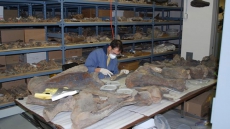ST. JOHN'S, N.L. — Police say abuse of prescription pain relievers is a huge problem for Newfoundland and Labrador but it lacks a crucial antidote: a provincewide computer tracking system.
RCMP Const. David Emberley says addiction to opioid drugs such as oxycodone, morphine and codeine can be particularly devastating.
"People who are fine, upstanding citizens become drug addicts who are just living day to day," he said. "Their whole day is about trying to get more drugs, and everything else kind of falls by the wayside."
Emberley, who serves on a combined enforcement unit with other Mounties and Royal Newfoundland Constabulary officers, said better tracking would help.
"Opioids are a huge problem. And this is not just in St. John's or the bigger centres but right across the province."
Individual pills often sell on the street for $80 or more depending on the dose and usually come from pharmacies, not illicit labs, he said. But Newfoundland and Labrador still lacks a full computer network that could trace those who fill multiple prescriptions from various doctors at different pharmacies.
Health Minister Steve Kent acknowledged that gap.
"There is a rising rate of opioid addiction in our province and addressing that is a top priority for government," he said.
About 40 per cent of 200 pharmacies are now linked to a computerized network, covering around 60 per cent of the population.
"We're actively working to increase that number to get everybody connected which will definitely make a difference."
Stephen Reid, executive director of the Pharmacists' Association of Newfoundland and Labrador, said there are technological stumbling blocks. Any network that will catch patterns of abuse has to allow physicians and druggists using multiple information technology providers to talk to each other, he said.
"You want a system that is the same at a pharmacy, at a hospital and a doctor's office. That's the only way people are going to be able to determine whether they're double-doctoring or whether they've visited a doctor's office and got multiple prescriptions."
Most other provinces have some form of pharmacy network, Reid said. He worked for the Ontario Medical Association in 2008 as that province launched its system.
Doctors, pharmacists, government officials and multiple IT vendors had to co-operate, he said.
Reid said a new committee will lead a similar effort in Newfoundland and Labrador.
Computer tracking in B.C. has been a powerful tool against prescription opioid abuse, said Dr. Evan Wood, medical director for addiction services at Vancouver Coastal Health.
Wood also holds the Canada Research Chair for inner city medicine at the University of British Columbia.
"In B.C. we've been spared the high rates of prescription opioid abuse partly because we have a database called PharmaNet that tracks every prescription," he said.
In general, Wood blames pharmaceutical industry marketing and a lack of physician education for what he called a dramatic hike in use of the drugs across Canada.
"We really need to see better training for physicians in terms of safe opioid prescribing and education around the management of acute and chronic pain."
The Canadian Centre on Substance Abuse says North America consumes 80 per cent of the world's opioids. More than 30 million high-dose tablets or patches of the highly addictive drugs are dispensed on average in Canada each year.
There's a lack of national data on related deaths, but a study released in July described a jump in Ontario fatalities.
Researchers from the Institute for Clinical Evaluative Sciences and St. Michael's Hospital reported that one of every eight deaths for Ontarians aged 25 to 34 was linked to opioid use in 2010, up from one in 25 in 1991.
Ron Fitzpatrick, executive director of the outreach centre Turnings in St. John's, works with addicts and former inmates. Opioids are especially insidious because addicts need ever increasing amounts to ease pain that spikes when they're not high, he said.
"They do things they never thought they'd ever do. Stealing, prostituting, violent crimes. It's very destructive."





